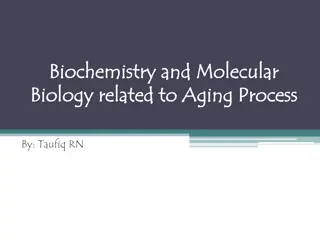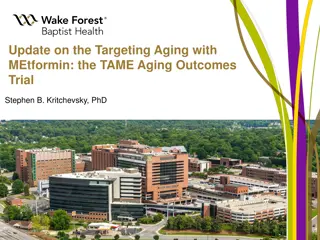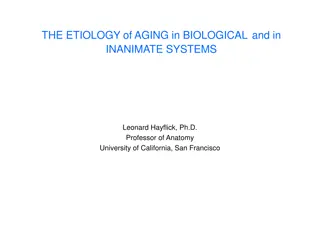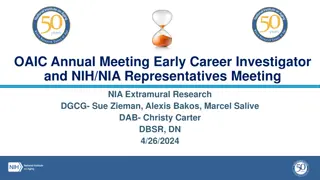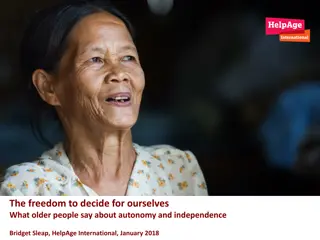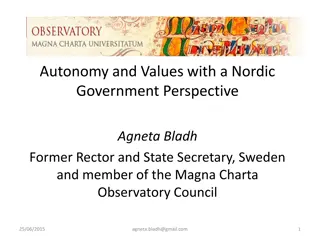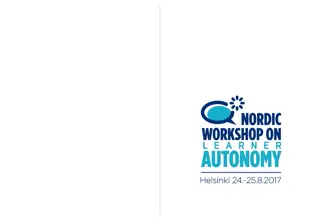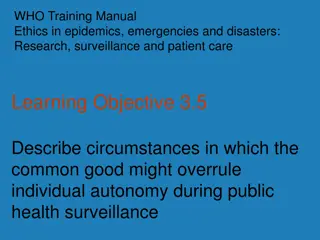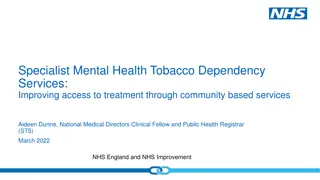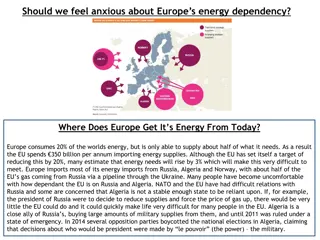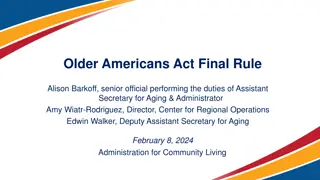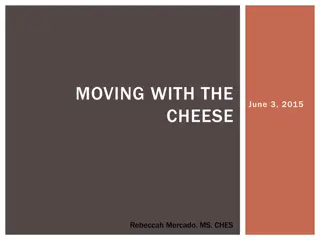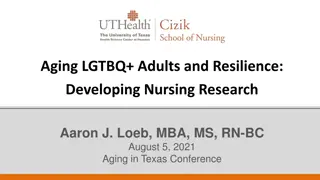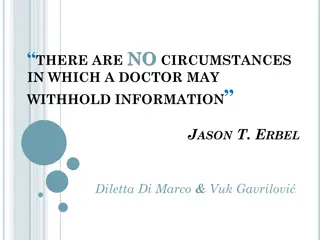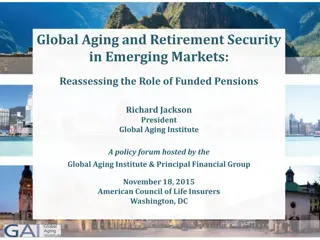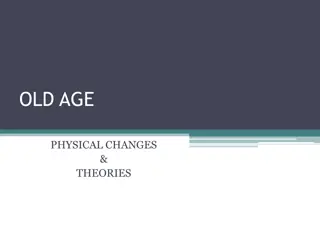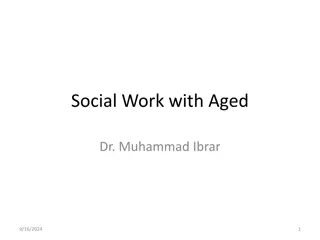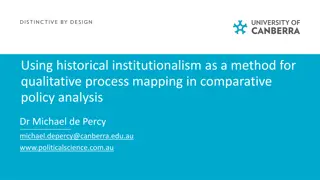Understanding Autonomy and Dependency in Aging
This content explores three conceptions of aging - chronological, biological, and psychosocial aging - and their impact on autonomy and dependency in older adults. It discusses how individuals age differently biologically and psychologically and examines the significance of interpreting and responding to age-related changes. The relationship between autonomy and dependency is highlighted through examples that either hinder or promote autonomy in aging individuals.
Download Presentation

Please find below an Image/Link to download the presentation.
The content on the website is provided AS IS for your information and personal use only. It may not be sold, licensed, or shared on other websites without obtaining consent from the author. Download presentation by click this link. If you encounter any issues during the download, it is possible that the publisher has removed the file from their server.
E N D
Presentation Transcript
Understanding Autonomy and Dependency in Aging Dr. Russell Woodruff Associate Professor of Philosophy St Bonaventure University
Objectives To describe three different conceptions of aging and the uses of these conceptions To describe the relationship between actual autonomy and dependency To produce examples of dependencies that hinder autonomy To produce examples of dependencies that promote autonomy
Three conceptions of aging Chronological aging Biological aging Psychosocial aging
Chronological Aging = Time spent alive from birth = How old are you? Chronologically, each of us ages at the same rate. Two people born at the same time will always be the same chronological age.
Biological Aging = Biological changes over time Biological aging (senescence) varies from individual to individual, depending on extrinsic factors (lifestyle and environment) intrinsic factors (genetic and physiological factors) Two people with the same chronological age will typically age at different rates biologically: changes in musculature, hormone levels, memory, etc. will occur at different rates.
Psychosocial aging = how we interpret/respond to biological changes over time Does a person see wrinkles as something negative to be disguised, something positive to be celebrated, or something neutral, of no concern? Does a person interpret a reduction in testosterone as normal, or as a problem to be addressed medically?
Psychosocial aging How people interpret and respond to biological change = the meaning they assign to such changes Varies from person to person, and from culture to culture In some cultures grey hair may be interpreted as a sign of wisdom; in others it may be interpreted as a sign of loss of vitality.
Is one concept of aging better or more correct than the others?
Concepts are tools Tools for making sense of their world. Concepts organize our experiences, and guide us in responding to the world. So the question of whether one of these concepts of aging is the correct or best one can be reframed as the question which concept is a better tool for making sense of aging?
But since different tools are better for different tasks, what we want to know is, what can we do with each of these concepts of aging? Maybe each of them is best for certain tasks?
What does understanding someones age chronologically allow us to do? What does understanding someone s age biologically allow us to do? What does understanding someone s age psychosocially allow us to do?
Chronological -- knowing how long a person has been alive serves as an indicator of a person s demographic cohort, and of which events they have lived through (e.g., WWII, apartheid, 9/11) Biological -- knowing the nature of intrinsic and extrinsic changes is the first step toward possible amelioration of any effects of those changes identified as undesirable Psychosocial -- recognizing the variability how people interpret changes allows us to question interpretations (e.g., wrinkles are bad ) and to reject seeing them as natural, universal, or inevitable
Understanding Autonomy and Dependency in Aging Autonomy, Independence, and Dependence -- How are they related?
Common way of thinking: autonomy = independence implies that dependency = loss of autonomy What we will do today will challenge the identification of autonomy and independence, revealing how dependencies can in many cases promote autonomy
George Agich Distinguishes ideal autonomy from actual autonomy Ideal autonomy = minimal constraints on one s choice Actual autonomy = being able to identify with one s choices
Example A college philosophy professor s self-conception and conception of a good life for herself involves teaching and writing philosophical essays. Such a person s sense of who she is her self-identify is defined by those choices, and not, for example, with the choice to make her own clothes. She chooses to be completely dependent on others to supply her clothing, thus allowing her to attend to other activities with which she more strongly identifies.
Agichs example a wheelchair-bound individual assisted by others in various activities of daily living. At the same time, this person is devoted to the cause of Food for Peace (FFP). What this woman can do for FFP is limited, yet she identifies strongly with it. She stuffs envelopes twice a week for the local chapter and rejoices when she sees a television feature on FFP s projects. She has visitors from FFP. Her choices are meaningful in the context of her identifications with FFP. She does not care whether she has her bath at 6:00 am on Thursday or at 2:00 on Friday. Not all choices matter to her, just those that are meaningful in terms of her participatory identification in a larger social context.
The takeaway The dependencies of the philosophy professor and Agich s FFP member enhance autonomy, allowing each to act in ways that matter to them. Such dependencies help to maintain a sense of functional integrity in the areas of life that individuals value .
Exercise: seeing how autonomy and dependency relate
Write out answers to the following five sets of questions. 1. Identify five ways in which you are dependent upon others. 2. Determine which if any of these dependencies hinder your actual autonomy, that is, restrict your ability to act in ways that matter to you. 3. Determine which if any of these dependencies promote your actual autonomy, allowing you to act in ways that matter to you. 4. Consider how growing older might affect these two sets of dependencies. Among dependencies that might hinder your actual autonomy, do you foresee any as becoming more likely to occur as you age? Could any autonomy-hindering dependencies become less likely? What about the dependencies that promote actual autonomy: are any of these likely to be enhanced as you age? Are any likely to be diminished as you age? 5. Consider the older adults in your lives: do you see dependencies in their lives that hinder their autonomy? Do you see dependencies that preserve or promote their autonomy?


